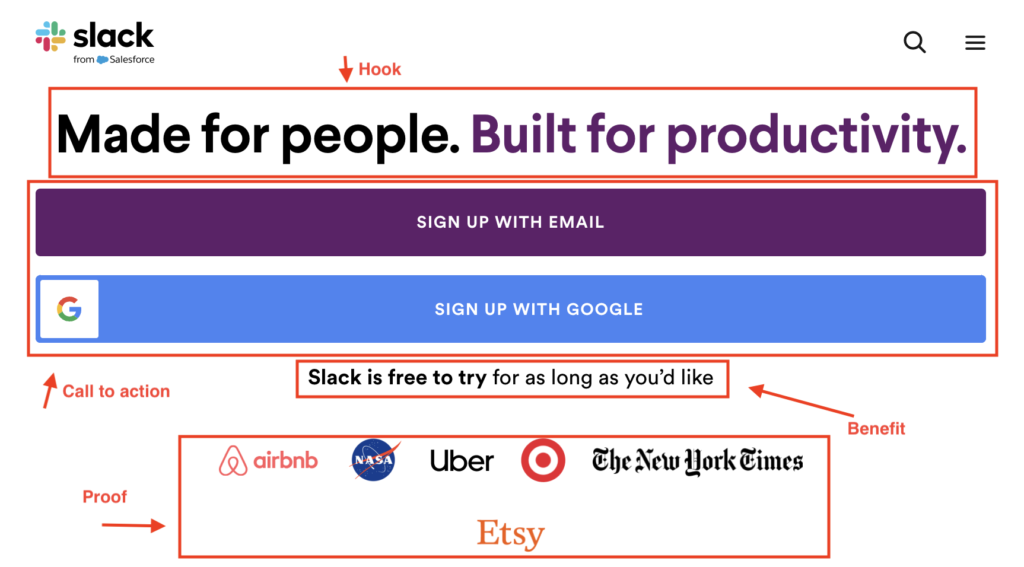Copywriters put together a very strategic puzzle where all the pieces work together towards one specific goal — driving the reader to take action.
Unless you’re living off-grid, you likely come in contact with copywriting every day. It’s on the websites you visit, billboards you see, social media ads you scroll by, and letters you get in the mail. Copywriting is everywhere! Yet, surprisingly, many don’t know exactly what it is and how it works.
What does a copywriter actually do?

Copywriting definition: A copywriter specializes in writing messaging known as “copy” that aims to persuade audiences to take a particular action. For example, copy is used in marketing and advertising campaigns in an effort to sell products or services.
To write in a way that gets someone to take a particular action, you need a deep understanding of both the action and the audience. So copywriters tend to study human psychology, decision-making, marketing, and sales techniques.
What does a typical copywriting project involve?
A typical copywriting project involves a few steps.
1. Research
First up is research. Copywriters have to dig in and understand the project at hand. Some of the key pieces of information they need to understand are:
- The client: Who wants the audience to take this action? Writers need to understand the client’s mission, vision, values, brand voice, personality, and differentiating factors on a deep level.
- The audience: Who is the target audience? Copywriters must learn the audience demographics, what they care about, and their related pain points.
- The action: What is the desired action? It could be getting buyers to sign up for a newsletter, try a product demo, or schedule a call.
- The benefits: Why would the audience want to take the action? What’s in it for them?
- The objections: Why might the readers hesitate to take the action?
- Objection handling: How can you overcome the hesitations the readers are facing?
2. Crafting copy
Once a copywriter has done their homework on a project, it’s time to craft the copy. In many cases, writers start with a framework. While frameworks vary depending on the medium of the copy, they typically involve a few key elements:
- Hook: An opening piece of copy that gets the reader’s attention (e.g. a headline of an article, an email subject line, the headline of an ad on social media)
- Connection: Copy that speaks to the reader’s specific pain points so they feel seen and understood.
- Benefits: Copy that builds desire by showing how taking the action will resolve the reader’s pain points and bring them benefits.
- Addressing/overcoming objections: Copy or elements that address and overcome the reader’s hesitations.
- Call to action: A direct request for the reader to take action and instructions on what to do.

3. Submission
After a copywriter has written a piece of copy, they’ll submit it to their client for review. The client may provide feedback and ask for revisions. The copywriter then takes that feedback, implements it, and returns the copy for another review. Once approved, the copy is published for the audience. Clients will then track the results of the copy drives to see if it’s effective.
What does a freelance copywriter do?

A freelance copywriter writes copy for clients on a freelance basis. Instead of being hired to work with one company, they are in business for themselves and work with many clients. For example, a freelance copywriter will likely have a website and social channels promoting their services. Clients may hire them for one-off projects or may work with them on an ongoing basis.
What’s the difference between a copywriter and a content writer?
Content writers write content that focuses on educating audiences and nurturing relationships with them rather than driving specific actions. It’s typically used in the higher levels of the buying funnel before audiences are ready to buy. For example, companies often hire content writers to write blogs, social media posts, and emails to build trust over time.
There’s typically some overlap between content and copy because copy includes content and content includes copy, but content writers lean more towards education and subtle selling, while copywriters lean more towards direct selling.
What qualifications do you need for copywriting?

There’s no specific certification or degree that’s required to become a copywriter. However, both could help you get hired. Copywriting requires a deep understanding of sales, marketing, writing, and psychology, so experience, professional training, certifications, or degrees in any of those areas can be helpful.
If you’re a freelance copywriter, clients will likely be looking for a portfolio of impressive work, testimonials from past clients, and a solid online presence. If you’re looking to be hired as an in-house copywriter, employers will be more likely to look for a Bachelor’s degree in creative writing, advertising, communications, or something similar. However, they may also be willing to accept the portfolio equivalent.
What are the duties of a copywriter?
Common duties of a copywriter include:
- Working within a team environment and collaborating with strategists, founders, other writers, designers, developers, etc.
- Strategizing persuasive copy that aligns with a company’s brand style and guidelines.
- Producing clear, concise, persuasive copy that drives results for clients.
- Iterating on copy and campaigns over time to improve results.
- Producing copy for a variety of channels including websites, social media, email, print, and more.
- Meeting deadlines.
Do copywriters make good money?
Copywriters can make good money. According to Indeed, the average salary of a copywriter in the United States is $63,165, with salaries ranging from around $40,000 up to $100,000. Additionally, freelance copywriters have the potential to make more by building a trusted brand, setting their prices, and managing multiple clients.
Want to browse freelance content and copywriting jobs? Head over to our job board to find 20-30+ new leads each week!

